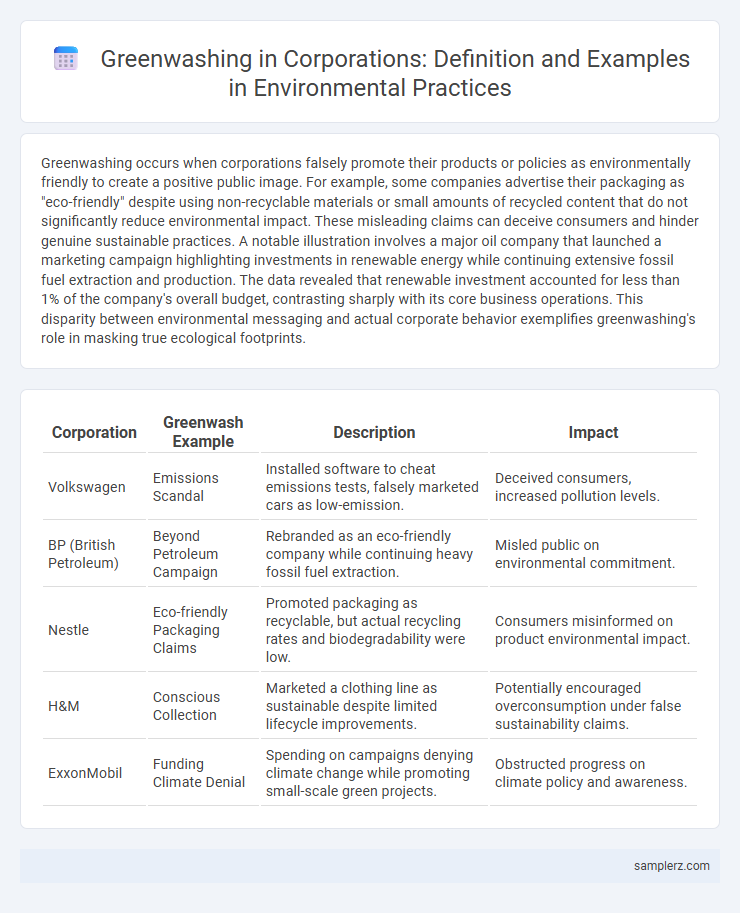Greenwashing occurs when corporations falsely promote their products or policies as environmentally friendly to create a positive public image. For example, some companies advertise their packaging as "eco-friendly" despite using non-recyclable materials or small amounts of recycled content that do not significantly reduce environmental impact. These misleading claims can deceive consumers and hinder genuine sustainable practices. A notable illustration involves a major oil company that launched a marketing campaign highlighting investments in renewable energy while continuing extensive fossil fuel extraction and production. The data revealed that renewable investment accounted for less than 1% of the company's overall budget, contrasting sharply with its core business operations. This disparity between environmental messaging and actual corporate behavior exemplifies greenwashing's role in masking true ecological footprints.
Table of Comparison
| Corporation | Greenwash Example | Description | Impact |
|---|---|---|---|
| Volkswagen | Emissions Scandal | Installed software to cheat emissions tests, falsely marketed cars as low-emission. | Deceived consumers, increased pollution levels. |
| BP (British Petroleum) | Beyond Petroleum Campaign | Rebranded as an eco-friendly company while continuing heavy fossil fuel extraction. | Misled public on environmental commitment. |
| Nestle | Eco-friendly Packaging Claims | Promoted packaging as recyclable, but actual recycling rates and biodegradability were low. | Consumers misinformed on product environmental impact. |
| H&M | Conscious Collection | Marketed a clothing line as sustainable despite limited lifecycle improvements. | Potentially encouraged overconsumption under false sustainability claims. |
| ExxonMobil | Funding Climate Denial | Spending on campaigns denying climate change while promoting small-scale green projects. | Obstructed progress on climate policy and awareness. |
Introduction to Greenwashing in Corporations
Greenwashing in corporations often involves misleading claims about eco-friendly practices, such as a company promoting a single recyclable product while ignoring broader unsustainable operations. For instance, some apparel brands market limited "sustainable" clothing lines but continue mass production relying on non-renewable resources and unethical labor. This deceptive strategy aims to attract environmentally conscious consumers without making significant environmental improvements.
Common Tactics Used in Corporate Greenwashing
Corporations often use misleading claims such as vague environmental jargon, selective disclosure of positive environmental practices, and superficial eco-friendly certifications to create a false impression of sustainability. Common tactics include emphasizing minor green initiatives while ignoring larger harmful impacts, using irrelevant or exaggerated environmental claims, and deploying green imagery in advertising to distract from unsustainable operations. These strategies aim to enhance corporate reputation and appeal to eco-conscious consumers without implementing substantial environmental improvements.
Case Study: Fast Fashion Brands and Green Claims
Fast fashion brands often engage in greenwashing by promoting limited eco-friendly collections while continuing unsustainable production practices. These companies highlight recycled materials in select products without addressing overall environmental impact, including excessive textile waste and carbon emissions. This misleading marketing confuses consumers and undermines genuine sustainability efforts in the fashion industry.
The Automotive Sector: False Eco-Friendly Marketing
The automotive sector frequently engages in greenwash by promoting hybrid or electric vehicles as entirely eco-friendly solutions despite ongoing issues like carbon emissions from battery production and limited recycling infrastructure. Corporations often highlight minor improvements in fuel efficiency or use of recycled materials while neglecting the broader environmental impact of vehicle manufacturing and disposal. This false eco-friendly marketing misleads consumers and delays genuine progress toward sustainable transportation.
Misleading Sustainable Packaging Initiatives
Several corporations engage in greenwashing by promoting sustainable packaging initiatives that are misleading, such as using vague terms like "eco-friendly" without clear evidence or certification. Companies may tout biodegradable or recyclable packaging while the materials used lack proper infrastructure for recycling, resulting in continued environmental harm. This deceptive practice undermines genuine sustainability efforts and confuses consumers seeking to make environmentally responsible choices.
Fossil Fuel Companies and Environmental Misinformation
Fossil fuel companies often engage in greenwashing by promoting minor investments in renewable energy while continuing to heavily finance oil and gas extraction. These corporations fund environmental misinformation campaigns that downplay climate change risks and emphasize inflated claims of carbon neutrality. Such strategies mislead the public and delay meaningful action on reducing greenhouse gas emissions and transitioning to sustainable energy sources.
Food and Beverage Industry: Organic and Natural Labeling
Many companies in the Food and Beverage Industry exploit terms like "organic" and "natural" to create a misleading perception of sustainability, despite minimal or no genuine environmental benefits. Products labeled as organic may still involve harmful farming practices, while "natural" lacks regulatory standards, allowing companies to greenwash their impact. This deceptive marketing undermines consumer trust and complicates efforts to promote truly sustainable food production.
Technology Giants and Carbon Neutral Promises
Technology giants often claim carbon neutrality while relying heavily on carbon offsets rather than reducing actual emissions, which exemplifies greenwashing. These corporations promote renewable energy investments, yet their data centers and supply chains continue to generate substantial carbon footprints. Such misleading environmental claims undermine genuine efforts to combat climate change and distort public perception of corporate sustainability.
Impact of Greenwashing on Consumer Trust
Greenwashing by corporations often involves misleading claims about environmental practices, leading to consumer skepticism and decreased trust in genuine sustainability efforts. Studies reveal that 60% of consumers feel betrayed when discovering greenwashing, which damages brand reputation and reduces customer loyalty. This erosion of trust hampers the overall progress toward sustainable consumption and environmental responsibility.
How to Identify and Challenge Corporate Greenwash
Companies often exaggerate their environmental efforts by using vague claims like "eco-friendly" without verifiable evidence or third-party certification, making it crucial to scrutinize their sustainability reports and marketing materials for transparency. Identifying corporate greenwash involves analyzing the discrepancy between a company's stated green initiatives and its actual environmental impact, such as continued fossil fuel investments or deforestation practices. Consumers and regulators can challenge greenwash by demanding measurable sustainability goals, independent audits, and greater accountability in environmental performance disclosures.

example of greenwash in corporation Infographic
 samplerz.com
samplerz.com